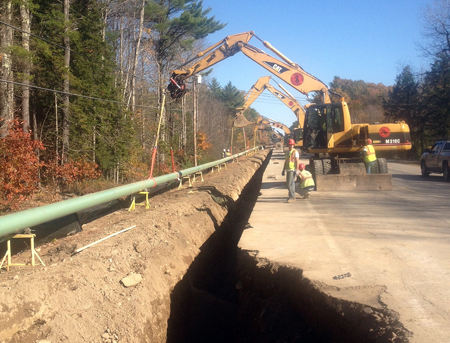AUGUSTA — A new government agency with the power to issue bonds and designate pipeline corridors could help the state increase natural gas supplies and lower electricity prices, according to a bipartisan group of lawmakers.
The group is sponsoring a bill that would create a quasi-governmental entity called the Maine Energy Cost Reduction Authority. The proposed agency would have the power to enter into contracts with companies to expand pipeline capacity in Maine or upgrade pipelines in southern New England.
Rep. Kenneth Fredette, R-Newport, the bill’s lead sponsor, said Tuesday that the proposal is designed to pair with another bill aimed at reducing electricity bills $170 million per year by tapping new gas fields in Pennsylvania and New York.
The bill creating the new agency is co-sponsored by Sen. John Cleveland, D-Auburn.
The new agency could either finance pipeline upgrades in Maine or partner with other New England states already involved in pipeline projects.
Fredette said the state isn’t well equipped to do any of that now.
Tom Welch, chairman of the Public Utilities Commission, agreed. Welch said Tuesday that the PUC can analyze the economic impact of energy projects, but the commission’s chief function is regulatory.
“We evaluate the economics of transactions and try to figure out ways that the benefits are actually flowing to the consumers,” he said. “It would be unusual for us to be the contracting authority.”
Fredette said he envisions the new agency leaning heavily on the guidance of the utilities commission. The agency would have a similar structure to the PUC: Three commissioners appointed by the governor and confirmed by the Legislature.
The commissioners would serve staggered six-year terms, long enough, Fredette said, to weather political and policy changes forwarded by the governor or the Legislature.
The goal, as Fredette described it, is for Maine to capitalize on the “historic opportunity” of cheap natural gas prices and create a 20-year energy strategy.
“I don’t want to see Maine left behind,” he said.
Increased natural gas supplies in the Northeast have already lowered electricity prices in New England. The state has saved $230 million a year since 2008, according to the PUC.
However, limited pipeline capacity in Maine and New England hasn’t allowed the region to fully capitalize on the discovery of new shale fields in Utica, N.Y., and Pennsylvania.
Energy experts say the region’s limited pipeline capacity, coupled with the region’s reliance on gas for electricity generation, is the reason why New England electricity prices remain the highest in the country.
According to ISO New England, gas-fired plants accounted for 15 percent of the region’s electricity in 2000. In 2012, the amount increased to 50 percent.
Lawmakers, state officials and Gov. Paul LePage have frequently talked about the need to bring more natural gas to Maine. However, Welch said, there isn’t a significant monetary incentive for gas suppliers and electricity generators to invest in expensive pipeline projects. The Northeast Gas Association has estimated pipeline projects costs about $1 million per mile.
Some pipeline companies are investing in upgrades in New England, but not Maine.
Still, Welch said, even if more natural gas doesn’t flow directly into the state, Maine could still benefit from increased supplies to Massachusetts where many gas-burning plants are located.
“It’s very useful if (shale gas) gets all the way to Maine, but helpful even if it gets into New England or Massachusetts,” said Welch, adding that major generators to the south play a significant role in setting prices for Maine and New England.
A project designed to increase capacity on the Algonquin Gas Transmission pipeline through Connecticut and Massachusetts is due for completion in 2016.
Maine has two pipelines that run through Canada, but production has fallen in that region and a new field in Newfoundland is projected to produce far less than the Marcellus field in Pennsylvania where some experts are predicting a 100-year supply.
Energy experts have identified risks associated with natural gas investments, including that the resource is finite and that the current low prices may not continue. Additionally, major producers such as ExxonMobil and Cheasapeake Energy are experiencing thin profit margins.
Exxon Chief Executive Rex Tillerson told The Wall Steet Journal in June 2012 that his company was making “no money” because gas prices had fallen below the cost of production
“We are losing our shirts,” Tillerson said.
Fredette’s bill was referred to the Legislature’s Energy Committee on Tuesday. A public hearing has not yet been scheduled.
Steve Mistler can be contacted at 620-7016 or at:
smistler@pressherald.com
On Twitter: @stevemistler
Send questions/comments to the editors.



Success. Please wait for the page to reload. If the page does not reload within 5 seconds, please refresh the page.
Enter your email and password to access comments.
Hi, to comment on stories you must . This profile is in addition to your subscription and website login.
Already have a commenting profile? .
Invalid username/password.
Please check your email to confirm and complete your registration.
Only subscribers are eligible to post comments. Please subscribe or login first for digital access. Here’s why.
Use the form below to reset your password. When you've submitted your account email, we will send an email with a reset code.